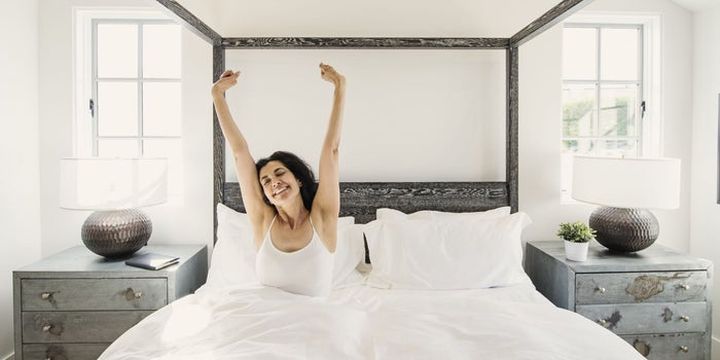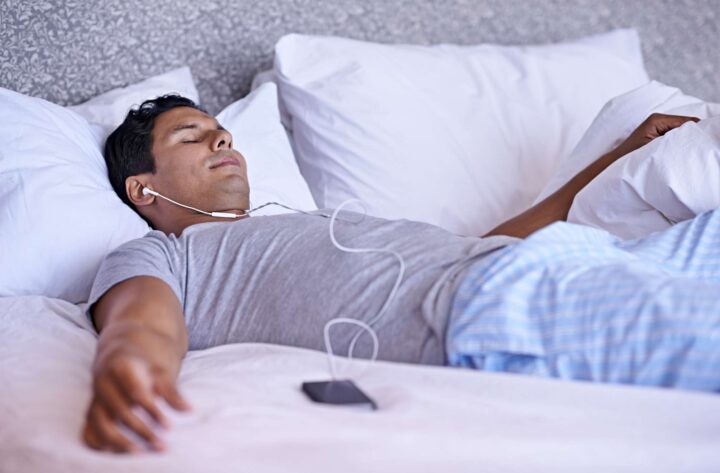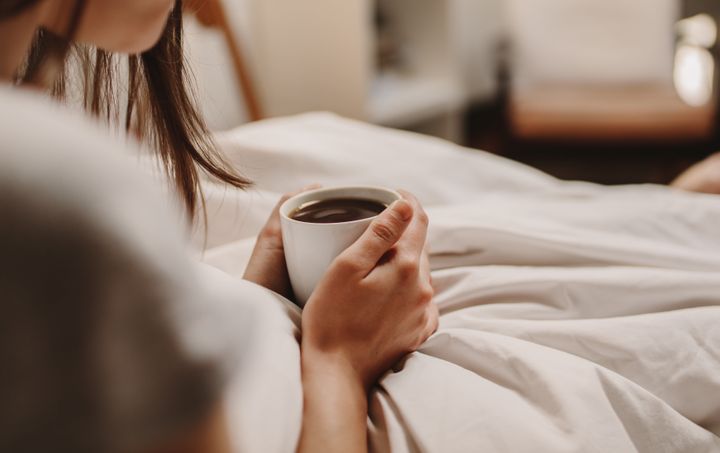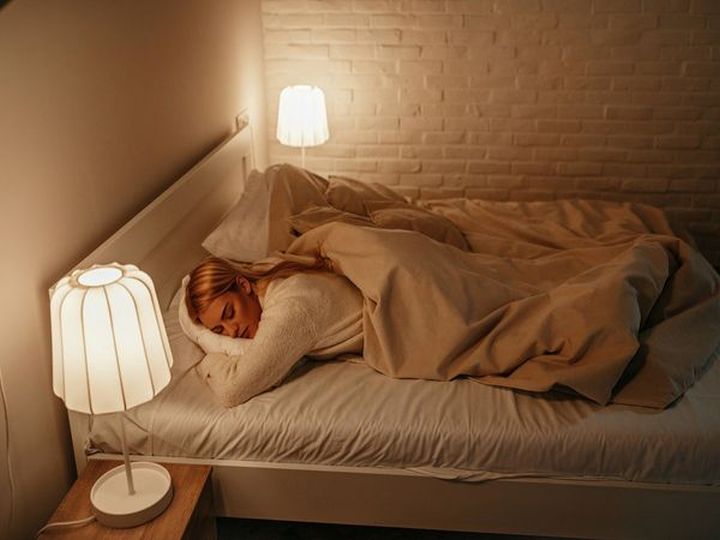A Guide to Trying to Improve your Sleep

Many of us are struggling with sleep at the moment. Our routines are disrupted, we’re spending more time at home, and we’re dealing with the craziness of the world. Poor sleep is to be expected.
Unfortunately, poor sleep can have a significant impact on our health and wellbeing. Tiredness is only one of the side effects of a poor night’s sleep. Lack of sleep can also put you at risk of serious health conditions like diabetes, heart disease, and obesity.
To help you fall into lullaby land, we’ve brought together some of our top sleep tips. Try out some or all of these to help you drift off easier.
1. Have Consistent Bed and Wake Up Times

The best thing you can do for your sleep is to get into a routine. This means going to bed and waking up at the same time.
Let’s talk about setting a consistent bed and wake up time.
The best way to set your bedtime is to work back from when you need to get up. Adults need between 6-9 hours of sleep so make sure you set your bedtime 6-9 hours before you have to get up.
Don’t forget to factor in time to get ready, dressed, and have breakfast before your commute. Even if you’re working from home right now, you should still make an effort to get up with time to wash, dress, and have breakfast. This will put you in a more productive mood and make you ready to face the day.
2. Set a Bedtime Routine

To have the best chance of drifting off to sleep, you’ll need a consistent and relaxing routine.
The first thing on your bedtime routine should be putting down your electronics and switching off screens.
The blue light that is emitted by phones, tablets, and other screens tricks your body into thinking that it’s day time. This prevents the production of melatonin and makes your brain fight to stay awake.
As far as possible, avoid looking at screens in the hour or two before you go to bed. It helps if you switch on the blue light filter on your phone or tablet at the same time. This means that even if you accidentally look at your phone, it shouldn’t disrupt your routine too much.
The next thing to think about is food and drink. Going to bed hungry will not help you sleep but neither will going to bed on a full stomach.
Find a middle ground by having a light supper. Ideally, choose foods that contain melatonin like cherries, oats, or strawberries.
Pair your supper with an herbal tea to really relax. Anything with chamomile or lavender is ideal.
In terms of caffeine, you don’t want to be drinking caffeine after midday ideally. At the very least you need to stop drinking caffeine about 4 hours before bedtime.

Your bedtime routine shouldn’t just be about what you can’t do. There are plenty of things you can do before bed that are soothing and relaxing. Consider adding a few of these activities to your bedtime routine:
- Take a warm bath.
- Do some meditation or breathing exercises.
- Stretch out your whole body.
- Listen to music.
- Journal or write out your thoughts.
3. Get your Bed Comfortable

We’ve all heard the story of the princess and the pea, right? Well, it might not be a pea that’s keeping you up. It could be a lumpy mattress or deflated pillow.
Most people aren’t aware that they should replace their mattress every 6-8 years. If your mattress is older than this it could be the reason you’re struggling to sleep.
Luckily, nowadays you have plenty of options when it comes to mattresses. You can choose the amount of support you need, the method of support, as well as the size and shape of the mattress.
If you have a bed partner with wildly different mattress preferences, you can even get mattresses with two different support levels.
When it comes to pillows, you should replace them every 1-2 years. If you’re looking to replace your old, ratty, childhood pillows, try a better pillow.
You could consider getting a memory foam pillow if you like a lot of personalized support. Some people find memory foam too warm, so you might want to consider a hybrid foam pillow.
Just because you prefer a thinner pillow, it doesn’t mean that you have to sacrifice quality. Plenty of companies manufacture thin pillows for those who prefer a more aligned sleep.
4. Keep your Bedroom for Sleep

As kids and teens, we tend to spend a lot of time in our bedrooms. We sleep there, we play there, we relax there, we eat there. This isn’t particularly good for our sleep.
Ideally, you should keep your bedroom as a space for sleeping. Don’t work in there, don’t hang out in there, definitely don’t eat in there!
If your brain learns to associate that room with sleep and sleep only, it will get into the habit of preparing for sleep when you’re in the bedroom.
I know that it’s not possible for everyone to reserve the bedroom for sleep. Especially seeing as we’re all cooped up at the moment.
You can try sectioning off parts of your room. This can be helpful if you have to work in your room. Try placing a screen or curtain around your bed or work area to keep them separate.
If you do spend a lot of time in your room, perhaps consider changing things up when it comes to bedtime. You could make sure that you draw curtains or close your blinds from DotcomBlinds before bed. Or perhaps you could switch to a lamp with softer lighting. Anything that can help your body and brain get into a sleep cycle.
5. Relax

If all else fails and you’re still struggling to sleep, just try to relax.
Often, when we’re struggling to sleep we find ourselves counting down the hours till we have to get up. We lay there cursing or pleading with our brains to just let us sleep.
That stress is not conducive to sleep. In fact, it tends to exacerbate insomnia.
The best thing you can do is to just focus on relaxing rather than sleeping.
Instead of fretting about how tired you are or how little sleep you’re going to get, switch your focus to how warm and cozy you are. Think about how lovely it is to have time to yourself to relax.Try some breathing or relaxation exercises without the expectation of sleep. Just do them to feel more relaxed.
Most of the time, once you’re calm and relaxed, you’ll drift off to sleep naturally. Stress, after all, does nothing for our wellbeing.
Even if you don’t manage to drift off, relaxation and meditation can help our bodies rejuvenate a bit. It’s not a replacement for good quality sleep, but it will help you make it through those difficult days.
Final Thoughts
Sleep is tricky. It seems to get more difficult with age. You don’t have to resign yourself to bad sleep for the rest of your adult life though. Why not try a MyiSense mattress to help you sleep better and be more productive for the next day.
For most people, periods of bad sleep improve with a few simple changes to their routine or sleeping arrangements. It could be as simple as switching out old pillows for newer, comfier models or making sure the blinds are fully closed.
If you’ve tried everything on our list and are still struggling with getting to sleep or staying asleep, you should consider speaking with your doctor to rule out any underlying health concerns.

